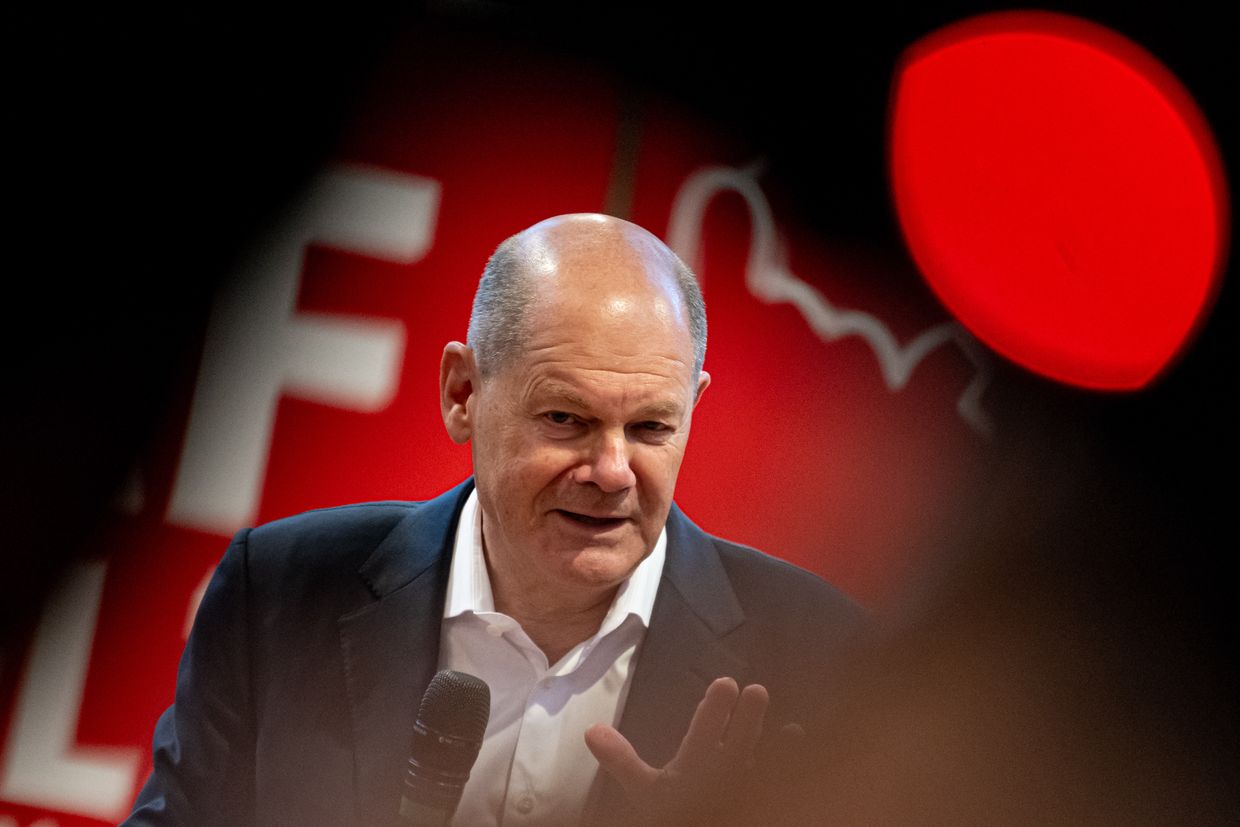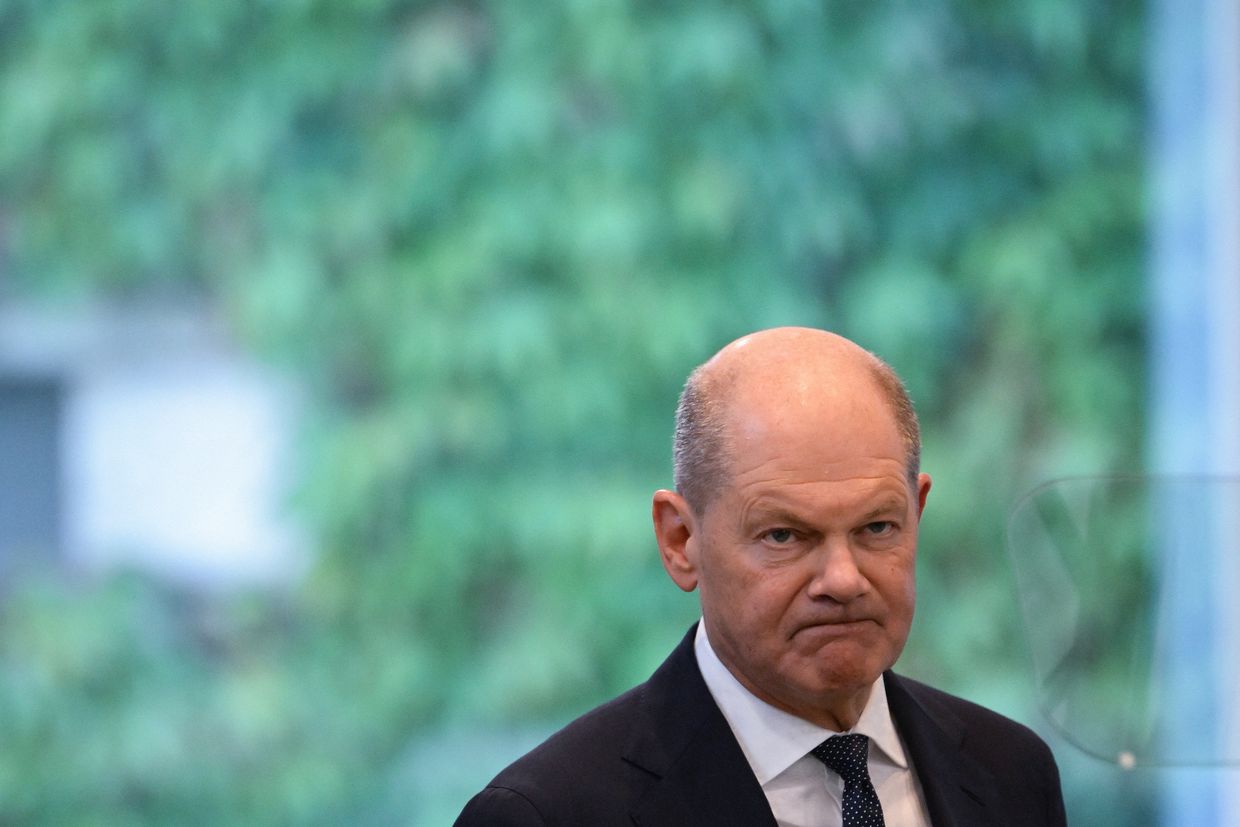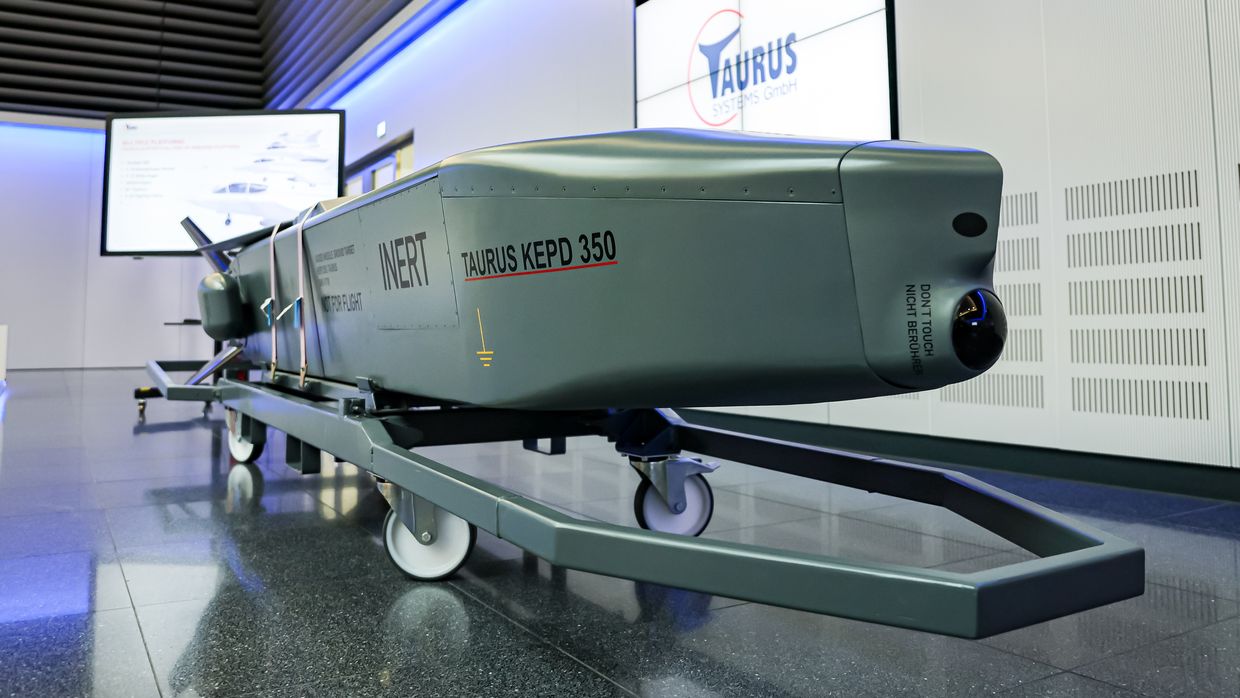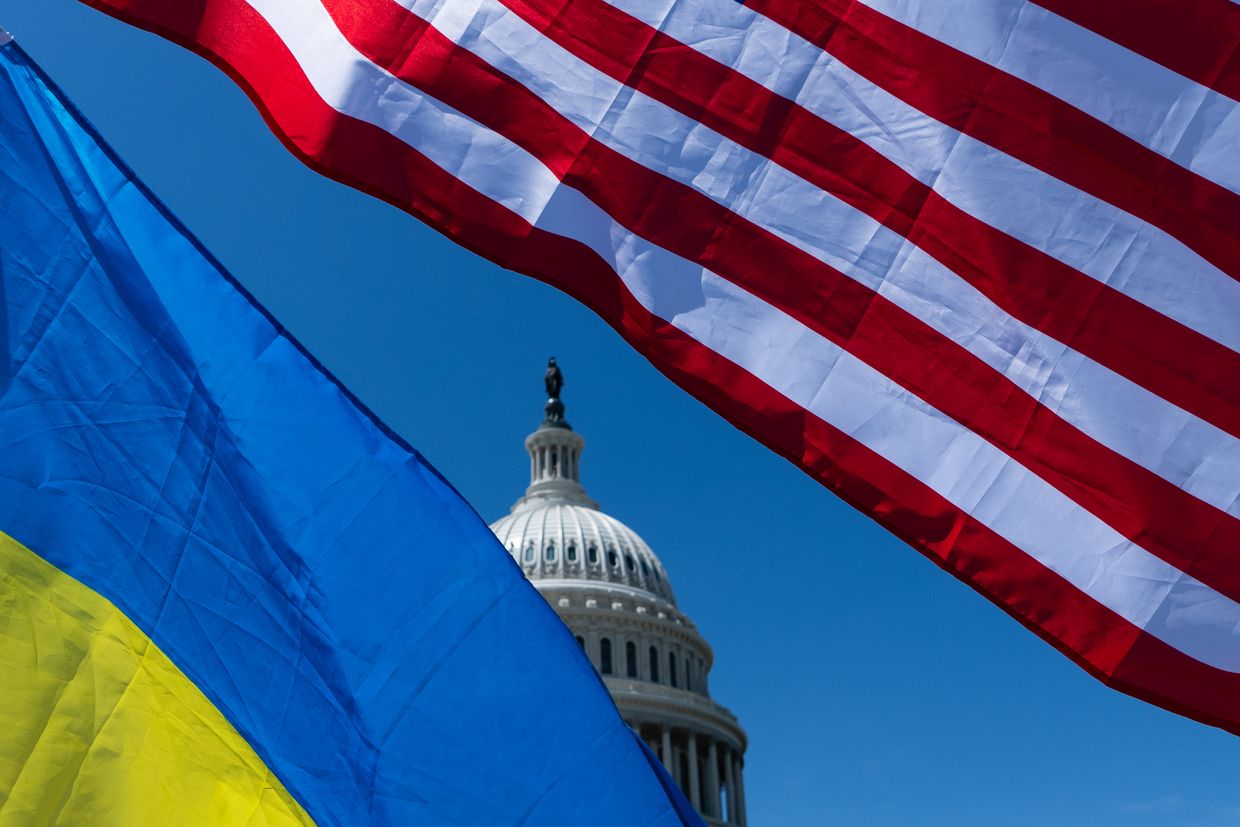With Scholz's government in shambles, conservative rival touts more decisive Ukraine strategy
A step away from chancellorship, opposition leader Friedrich Merz pledges a break from Berlin's dithering, but the growing Ukraine fatigue, economic downturn, and Washington's potential withdrawal remain an obstacle to overcome.

Friedrich Merz, leader of the Christian Democratic Union (CDU), addresses the Bundestag in Berlin, Germany, on Wednesday, Sept. 11, 2024. (Krisztian Bocsi/Bloomberg via Getty Images)
Editor's note: The article was updated to reflect Friedrich Merz's latest comments regarding the debt brake.
For the second time in his life, Friedrich Merz is a step away from taking charge of Germany.
Losing the fight to control the Christian Democratic Union in 2002 to future Chancellor Angela Merkel and forced to retire from politics a few years later, Merz is now the frontrunner to lead the Union back into government.
With Germany's ruling center-left coalition in tatters, Ukraine's leading European backer is heading toward snap elections set for Feb. 23. And it's all but certain that Chancellor Olaf Scholz, a Social Democrat, will lose his post as a result.
The domestic turmoil comes at a critical moment for Ukraine as Russia holds the upper hand on the battlefield, and Donald Trump's imminent return to the White House may lead to a decreased U.S. involvement in the war.
Yet, not all is grim for Kyiv.
Polls predict a sweeping victory for the center-right Christian Democratic Union/Christian Social Union (CDU/CSU), whose leader Merz seems ready to ditch Scholz's cautious Ukraine strategy.
Merz has called for an ultimatum to Moscow after which Ukraine could receive the much-desired Taurus missiles, powerful weapons that Scholz refused to provide. He also urged Europe to take up leadership in the pro-Kyiv coalition amid uncertainty about Trump's presidency.
For that, the 69-year-old conservative has his work cut out for him.
With a real possibility of a U.S. withdrawal, rising Ukraine-skeptic parties in Germany on the left and right, and an increasingly tight budget, Merz must cross a string of obstacles to deliver on his plans.
"Even an outspoken Merz and a strong CDU/CSU showing in the next elections will not be able to defy gravity when it comes to providing Ukraine with additional military capabilities, defense-industrial capacity, and budgetary support," Jorn Fleck, senior director with the Europe Center at the Atlantic Council, told the Kyiv Independent.
"Germany's capacity on all three is lagging and shifting the needle in all these areas — more kit, more ammo, more macro-financial assistance — is measured in years, not weeks or months."
But for Merz, whose main rival Merkel has pushed the country into a painful dependence on Russia, solving the problems ultimately created by the former chancellor's policies may be worth the fight.
Ukraine aid safe, but Germany braces for turmoil
The coalition of Scholz's Social Democratic Party (SPD), the liberal Free Democratic Party (FDP), and The Greens fell apart on Nov. 6 after the chancellor dismissed Finance Minister Christian Lindner, the FDP leader.
Scholz and Lindner were at odds on nearly all questions concerning the way to handle the staggering budget deficit and the country's vast economic problems.
According to Lindner, however, the final nail in the coffin of mounting disputes was the ex-finance minister's proposal to send Ukraine Taurus missiles instead of an additional 3 billion euros ($3.2 billion) in military aid requested by Scholz.
The chancellor now leads a minority government and will have to seek Merz's party support to pass the budget.
While the government's dramatic collapse sparked some concern about the flow of support from Europe's largest military donor, arms for Ukraine seem to be safe at the moment. Both Scholz and Merz agree to provide Kyiv with the necessary aid.
Germany allocated around 8 billion euros in military aid to Ukraine in 2024. The federal budget for 2025 contains only half of that, with Berlin hoping that the G7 loan can cover additional assistance.
"The previously planned and initiated support for Ukraine can continue without restriction," and additional aid can be theoretically approved under provisional budget management, said Michael Wustmann, a research assistant from the office of German lawmaker Sebastian Schäfer, who sits on Bundestag's budget committee.
But Germany heads towards months of political wrangling that will keep its leaders distracted from Ukraine. Even if Merz's CDU/CSU secures the expected victory, difficult coalition negotiations are likely to follow.
"Germany will be preoccupied with itself until the election and then for another four to six months, depending on how long it takes to form a coalition," says Martin Bialecki, editor-in-chief of the journals Internationale Politik (IP) and Internationale Politik Quarterly (IPQ).
"There will be no momentum, no leadership in Europe, and also no reaching out to France, Poland, and the U.K., which is so urgently needed. And all this before (and after) Trump takes office, under whom freezing of the war would be the most likely scenario," he told the Kyiv Independent.
Breaking from the legacy of Scholz, Merkel
Merz, a former corporate lawyer and multimillionaire representing CDU/CSU's right wing is the most likely candidate to enter the chancellery early next year. His party currently enjoys the support of 32% of Germans, more than the entire ruling coalition combined.
Ascending to the party leadership in early 2022, Merz presents a sharp break from the 16-year era of his centrist predecessor, Merkel, who ruled Germany from 2005 until 2021.
Merkel's legacy has been tainted by Germany's deepened energy dependence on Russia and the neglect of the Bundeswehr, the country's military. In contrast, her main critic within the CDU/CSU Merz has called on Europe to stand up decisively to Russian aggression and pledged to maintain defense spending above 2% of GDP, as per NATO's requirements.


Germany expects to hit the 2% threshold in 2024 for the first time in three decades, though its ability to maintain this level remains in question.
In a recent op-ed, Merz also rejected Scholz's policy of caution as a "desperate hope of being able to portray himself as a 'peace chancellor'" while urging Europe to assert leadership in aiding Ukraine.
"I believe Merz thinks more 'European' than is currently apparent… Among the many mistakes Scholz has made, his lack of interest in Europe is one of the more consequential," Bialecki said.
The CDU/CSU leader addressed the most widely discussed subject to highlight his differences with the incumbent chancellor: the Taurus missiles.
Lawmakers from Merz's party have repeatedly urged the government to provide Ukraine with the following cruise missiles, which can strike targets at a distance of 500 kilometers (300 miles). Scholz has been adamant, however, fearing such a move could draw Berlin into the war.
"The delivery of Taurus is anything but an entry into war," Merz said last month on the ARD television channel.
In an interview with the Stern magazine, Merz proposed giving Russian President Vladimir Putin an ultimatum — if he does not stop his war within 24 hours, Kyiv's partners would lift restrictions on long-range strikes. If even that step is not sufficient, Germany would deliver Taurus missiles a week later.
Ukraine's military currently operates long-range missiles like SCALP/Storm Shadow and ATACMS provided by the U.S., the U.K., and France but is not allowed to use them against targets on Russian soil.
Under Merz's helm, "Kyiv could expect more vocal and decisive messaging… on why Germany should see it in its vital national interest that Ukraine succeeds," Fleck commented.
"Making the case to the German public will be crucial if Berlin is to sustain its support for Ukraine in the long term, and such public diplomacy at home is where the outgoing government failed significantly."
Will Merz deliver German leadership?
The question remains to what extent Merz's rhetoric will transform into real steps beyond the electoral campaign.
Whoever becomes chancellor in 2025 will face serious obstacles, namely the economic downturn and budget constraints.
"Until now, Merz has maintained the CDU/CSU's key tenet, which has been upholding the debt brake, but he has now declared his willingness to discuss this option. This shows both an escalating electoral campaign and an openness to a possible future coalition with the SPD," said Zuzana Zavadilova, a Germany researcher at the Prague-based Association for International Affairs think tank.
The opposition leader "has called for an enormous defense budget hike, but it remains unclear how it will be funded without increasing the debt."
Another challenge is the growing support for Ukraine-skeptic parties like the far-right Alternative for Germany (AfD) or the left-populist Sahra Wagenknecht Alliance (BSW).
Some AfD members are under investigation for allegedly taking money from Russian agents, while Wagenknecht sought to leverage her success in regional elections to undermine support for Ukraine.
Merz has previously said that a pro-NATO, pro-Kyiv course is non-negotiable in any coalition talks.

But the rising support for BSW and the AfD signals a growing Ukraine fatigue in Germany, with some hesitant voices growing louder also within the CDU itself, said Jakub Eberle, a senior researcher at the Institute of International Relations Prague.
A recent poll showed that the popular support for German military aid for Ukraine has dropped from 66% to 57% compared to last year, while 43% of respondents said that Kyiv should cede territory to achieve peace.
The question of a post-election coalition remains open. Some prominent CDU/CSU leaders have rejected an alliance with decisively pro-Ukraine Greens, while the FDP may struggle to even cross the 5% threshold to enter parliament.
Paradoxically, the SPD now appears to be Merz's most likely coalition partner, "which puts additional constraints on any significant moves away from the status quo," Eberle told the Kyiv Independent.
The expert also raised doubts about how feasible Merz's aim of an independent European leadership is: "The position of the Trump administration will have a way larger impact on Germany's policies than whether the next German chancellor will be Friedrich Merz, Olaf Scholz, or any other of the probable candidates."
While it may be more decisive in some concrete issues like Taurus missiles, Merz's government will likely "stick with Germany's current policies (of) steady support of Ukraine with both military and financial assistance, but probably also the reluctance to move in much quicker or decisive manner," Eberle concluded.














